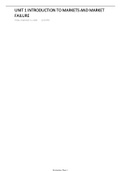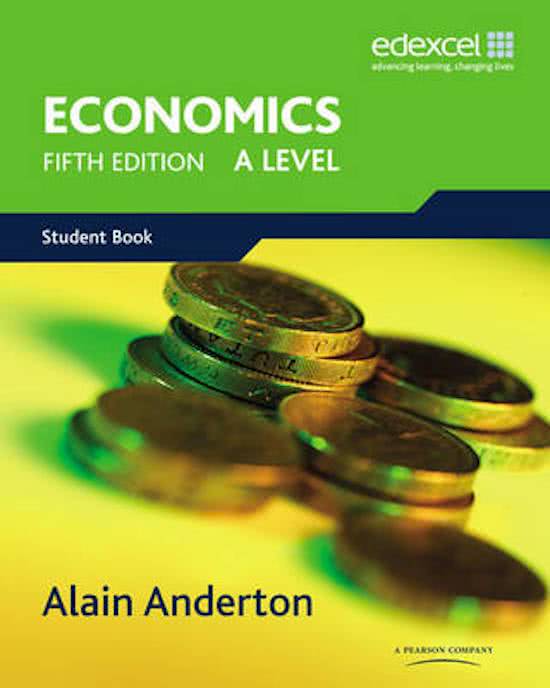UNIT 1 INTRODUCTION TO MARKETS AND MARKET
FAILURE
Friday, September 11, 2020 12:43 PM
Economics Page 1
,1. Economics As A Social Science
Friday, September 11, 2020 12:46 PM
Economics studies the choices people take under the conditions of scarcity and uncertainty
The Scientific Method:
There are many sciences covering a wide field of knowledge.
• What links them all is the scientific method
Scientific Method - a method which subjects theories or hypotheses to falsification by empirical evidence
• The scientific method, a scientist:
○ Puts forwards a theory
Theory or Model - a hypothesis which is capable of refutation (can be proved true or false) by empirical evidence
○ Gathers evidence to either support the theory or refute it
○ Accepts, modifies or refutes the theory
Economics - the science:
It is very difficult to use the scientific methods in social sciences e.g. Politics, sociology , economics
Social science - the study of societies and human behaviour using a variety of methods, including the scientific method
• It is often not possible to set up experiments to test hypotheses
• Often not possible to establish control groups or the conduct experiments in environments where only 1 factor is changed
○ The economist has to gather data in the everyday world where many variable change over a given period of time, thus
it is difficult to decide if the evidence support or refutes the theory
• Economists sometimes come to very different conclusions when considering a particular set of data as interpretations vary
• In economics much analysis is couched in terms of 'it is likely to' or 'this may possibly happen'
○ This language is used as economists know they have insufficient data to make firm predictions
Theories & Models:
An economic theory is generally expressed in looser terms than a model
• Theories can often be expressed in words
Economics models, require greater precision in their specification and are often expressed in mathematical terms
The purpose of modelling:
There is an infinite no. Of interactions happening at any moment in time.
One of the reasons why we construct theories or models is because we want to know why something is as it is.
• More importantly we use them all the time in deciding how to act e.g. Keeping away from fires
Simplification:
This implies that some factors have been included in the model and some have been omitted.
It could even be the case that some factors have been distorted to emphasise particular points in a model.
• E.g. On a road map small villages etc will not be shown while motorways will
Assumption & Ceteris Paribus:
All sciences make assumptions when developing models & theories
• Assumptions allow the scientist to simplify a problem to make it manageable to solve
An important way in which economists simplify reality is to adopt the ceteris paribus condition
• Ceteris Paribus is Latin for 'all other things being equal'
Positive & Normative Economics:
Economics is concerned with 2 types of investigation.
Positive Economics - the scientific or objective study if the allocation of resources
• It is concerned with finding out how economies & markets actually work
Positive Statements - a statement that is refuted or supported by evidence
Normative Economics - the study & presentation of policy prescriptions involving value judgements about the way in which
scarce resources are allocated
Normative Statements - a statement which cannot be supported or refuted because it is a value judgement
• Normative statements are subjective statements I.e. they carry value judgements about what ought to be
• For example: a high level of unemployment is more harmful to the economy than a high rate of inflation
Economics Page 2
, • For example: a high level of unemployment is more harmful to the economy than a high rate of inflation
• Economists tend to be interested in both positive and normative economics.
○ They want to find out how economics work but want to also influence policy debates
• Normative statements often contain positive economics within it.
Positive Statements -
• Objective Statements that can be tested, amended or rejected by referring to available evidence
• Positive economics deals with objective explanation and the testing and rejection of theories
• A false statement is also a positive one e.g. The falling price of crude oil in world markets will lead to a fall in demand for
fuel efficient cars
Economics Page 3
, 2. Economic Data
Saturday, September 12, 2020 10:04 AM
The Collection & Reliability of Data:
Economists collect data for two main reasons:
• The scientific method requires that theories be tested. Data may be used to refute or support a theory.
• Economists are often required to provide support for particular policies . Without economic data it is often difficult, if not
impossible, to may policy recommendations.
○ Without clear knowledge of where the economy is at the moment, it is impossible to forecast how it might change in
the future and to recommend policy changes to steer the economy in a more desirable direction
Collecting economic data is usually very difficult & sometime impossible
• Some macroeconomic data - balance of payments - are collected from a wide variety of sources,
○ Not surprisingly, the info is inaccurate
• Some exporters & importers will conceal transactions to avoid tax, others won't be bothered with the paperwork.
• Other macroeconomic data - CPI Consumer Prices Index ( used to measure inflation) or the Labour Force Survey (used to
measure employment & unemployment) are based on surveys.
○ Surveys are only reliable if there is accurate sampling & measuring and are rarely as accurate as a complete count
Some macroeconomic data are very reliable statistically but don't provide a good measure of the relevant economic variable
• In the UK, the unemployment Claimant Count is calculated each money at benefit offices throughout the country
○ It is extremely accurate
▪ But some people cheat the system as some claim for being unemployed but are, and there are many that are
unemployed but are not claiming benefit
• In microeconomics use is made of survey data, with the limitations that this applies
○ Economists also make use of more experimental data, gathering evidence for case studies e.g. They may want to
look at the impact of different pricing policies on entry to sport centres
In economics it is difficult to gather accurate data and, for that reason, academic economists mostly qualify their conclusions.
Real & Nominal Values:
In economic, the most important measure used is the value of an item measured in monetary terms, such as £,$ or Euros
• One problem in using money as a measure is that inflation (the general change in prices in an economy) erodes the
purchasing power of money
Nominal values - values unadjusted for the effects of inflation (i.e. Values at current prices)
• Expressed at current prices (i.e. At the level of prices existing during the time period being measured)
Real Values - values adjusted for inflation (i.e. Values at constant prices)
• To do this in practice involves taking one period of time as the base periods
Base Period - the period, such as a year or a month, with which all other values in a series are compared
○ Data are then adjusted assuming that prices were the same throughout as in the base period
Indices:
It is often more important in economics to compare values than to know absolute values.
For instance, we might want to compare the real value of output in the economy in 2003 and 2013
• So, many series are converted into index number form. One time period is chose as the base period and the rest of the
statistics in the series are compared to the value in that base period.
○ The value of the base period is usually 100 as it is easy to work with mathematically
○
Interpretation of Data:
Data can be presented in many forms and be used both to inform and mislead the reader
Economics Page 4





